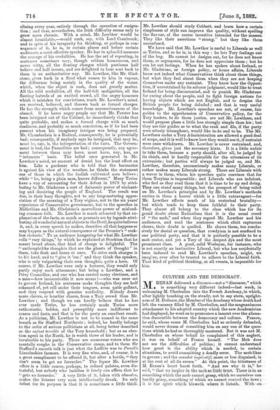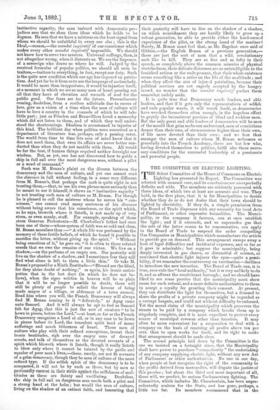CIILIURE AND THE DEMOCRACY.
AlRENAN delivered a discours—not a" discourse," which • is something very different indeed—last week, in welcoming M. Cherbuliez into the French Academy, in which, after lightly touching on the steady, not to say stern, upright- ness of M. Dufaure, the Member of the Academy whose death had left the vacancy filled by M. Cherbuliez, and the magnanimous attachment to his adopted country which the new Academician had displayed, he went on to pronounce a lament over the aliena- tion discernible between the democracy and culture. France, he said, whose cause M. Cherbuliez had so ardently defended, would never dream of consulting him on any one of the ques- tions which he had so thoroughly mastered. But it was not M. Cherbuliez on whose behalf he complained of this neglect, it was on behalf of France herself. " The Mob does not see the difficulties of politics ; it cannot understand how great is the ability which is needed, in certain situations, to avoid committing a deadly error. The mob likes to govern ; and the ,nandat imperatif, more or less disguised, is at the root of all its errors." At this point, the bitterness of M. Renan's heart burst forth. " And see why it is," he said, " that we inspire in the mob so little trust. There is in us something which the mob cannot grasp, which we ourselves can hardly grasp, something of which we cannot control the laws ; it is the spirit which bloweth where it listeth. With an instinctive sagacity, the man imbued with democratic pre- judices sees that we shun those ideas which he holds to be dogmas. He sees that we have a mistress on the least signal from whom we should be unfaithful to every one else ; this is the Ideal,—reason,—the mandat imperatif of our conscience which makes every other mandat impe'ratif impossible. We should not know how to serve two masters. Universal suffrage, then, is not altogether wrong, when it distrusts us. We are the liegemen of a sovereign who draws us where he will. Judged by the received formulas of popular politics, we should all soon be traitors,—traitors to everything, in fact, except our duty. Such is the quite new condition which our age has imposed on patrio- tism. And yet far be it from us to use the language of melancholy. It would be more than inopportune, it would be injustice itself, at a moment in which we see so many men of heart pouring out all that they have of elevation and warmth of soul for the public good. Our fears are for the future. Presentiments coming, doubtless, from a restless solicitude due to excess of love, give us a vision of a time when the man of culture will have to love a country in the counsels of which he will take little part ; just as Fenelon and Beauvilliers loved a monarchy which did not listen to them, and of which they well under- stood the shortcomings. Idealism is accustomed to injuries of this kind. The brilliant day when politics were conceived as a department of literature was, perhaps, only a passing error. The world from time to time lets men of mind know that it does not need them, that even its affairs are never better con- ducted than when they do not meddle with them. All would be for the best, if human things required neither foresight nor wisdom. But, as yet, one has not discovered how to guide a ship in full sail over the most dangerous seas, without a pilot or a word of command."
Such was M. Renan's plaint on the divorce between the democracy and the men of culture, and yet one cannot read the discours in full without feeling, in a sense very different from M. Renan's, that perhaps the mob is quite right in not trusting them,—that, to use his own phrase more seriously than he meant to use it himself, it shows an " instinctive sagacity " in not trusting such men of culture as M. Renan. For though he is pleased to call the mistress whom he serves his " con- science," one cannot read many sentences of his discours without being aware that his conscience, or the spirit which, as he says, bloweth where it listeth, is not made up of very stern, or even manly, stuff. For example, speaking of those stern Genevan Protestants—M. Cherbuliez's father had once been one of them—whose system of faith was so cold and clear, M. Renan moralises thus :—" A whole life was perfumed by the memory of these fertile beliefs, of which he found it possible to sacrifice the letter, without giving up the spirit." " Without being conscious of it," he goes on, "it is often to these refuted creeds that we owe the remains of our virtue. We live on a shadow,—on the perfume of an empty urn. Our posterity will live on the shadow of a shadow, and I sometimes fear they will find what alone is left to them a little thin." Or take M. Renan's proposal for a Ninth Beatitude—"Blessed are the blind, for they alone doubt of nothing;" or again, his ironic antici- pation that in the last days (in which he does not be- lieve), when the signs written in heaven will be so plain that it will be no longer possible to doubt, there will still be plenty of people to solicit the honour of being made mayor of a village, or alderman of a town council. Read him where you will, the French Democracy will always find M. Renan coming to it "delicately," as Agag came unto Samuel. And it will always be apt to feel as Samuel felt for Agag, that this is just the sort of creature " to be hewn in pieces, before the Lord,"—at least, so far as the French Democracy recognises a Lord at all, or in any case to be hewn in pieces before its Lord, the truculent spirit bred of many sufferings and much bitterness of heart. These men of culture who play with their refined conceptions, invent their ironic, beatitudes, sigh over the empty urns of decayed creeds, and talk of themselves as the devoted servants of a spirit which bloweth where it listeth, though it really listeth to blow only where it cannot be tainted by the garlic and squalor of poor men's lives,—these, surely, are not fit servants of a grim democracy, though they be men of culture of the most refined type. If the selfish spirit of the democracy is to be conquered, it will not be by such as these, but by men as profoundly earnest in their strife against the selfishness of mul- titudes as these are dainty and vacillating. Doubtless, the ship in full sail on dangerous seas needs both a pilot and a strong hand at the helm ; but would the men of culture, living on the shadow of an extinct faith, and lamenting that their posterity will have to live on the shadow of a shadow, on which nourishment they are hardly likely to grow up a robust generation, be able to provide either the hard-earned experience of the pilot, or the strong hand of the mariner ? Surely, M. Renan must feel that, as Mr. Bagehot once said of Gibbon, the English Renan of a previous generation,— these are just the sort of men that a wild, revolutionary mob like to kill. They are so fine and so lofty in their speech, so completely above the common miseries of physical wretchedness, their delicate distresses are so unintelligible to the famished artisan or the rude peasant, that their whole existence seems something like a satire on the life of the multitude ; and when they affect the airs of injured patriotism, because their political services are not eagerly accepted by the hungry crowd, no wonder that the mandat imperatif pushes them somewhat rudely aside.
It is quite true that Democracy needs leaders, and able leaders, and that if it gets only the representatives of selfish and rude popular wants, it will wreck itself, as democracies have wrecked themselves often enough, in the hopeless effort to gratify the inconsistent passions of blind and reckless men. But the only great and able leaders of democracies will be men of the mould that grim mobs can understand, men of convictions deeper than their own, of strenuousness higher than their own, of life more devoted than their own; and we fear that amongst the men of culture whom M. Renan welcomes so gracefully into the French Academy, there are but few who, having devoted themselves to politics, fulfil also these neces- sary conditions for the successful leadership of a passionate and powerful people.















































 Previous page
Previous page